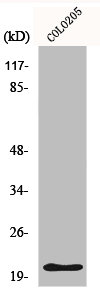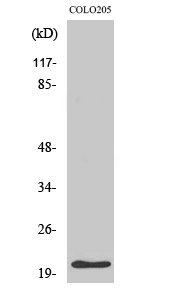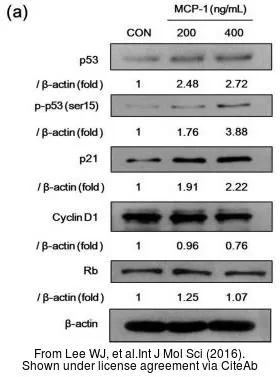![ICC/IF analysis of human primary fibroblasts using GTX27903 p21 Cip1 antibody [WA-1]. Green : Primary antibody Red : Actin Blue : DAPI ICC/IF analysis of human primary fibroblasts using GTX27903 p21 Cip1 antibody [WA-1]. Green : Primary antibody Red : Actin Blue : DAPI](https://www.genetex.com/upload/website/prouct_img/normal/GTX27903/GTX27903_20191025_AP_002_200_w_23060722_769.webp)
ICC/IF analysis of human primary fibroblasts using GTX27903 p21 Cip1 antibody [WA-1]. Green : Primary antibody Red : Actin Blue : DAPI
p21 Cip1 antibody [WA-1]
GTX27903
ApplicationsImmunoFluorescence, Western Blot, ELISA, ImmunoCytoChemistry, ImmunoHistoChemistry, ImmunoHistoChemistry Paraffin
Product group Antibodies
ReactivityHuman, Primate
TargetCDKN1A
Overview
- SupplierGeneTex
- Product Namep21 Cip1 antibody [WA-1]
- Delivery Days Customer9
- ApplicationsImmunoFluorescence, Western Blot, ELISA, ImmunoCytoChemistry, ImmunoHistoChemistry, ImmunoHistoChemistry Paraffin
- CertificationResearch Use Only
- ClonalityMonoclonal
- Clone IDWA-1
- Concentration1 mg/ml
- ConjugateUnconjugated
- Gene ID1026
- Target nameCDKN1A
- Target descriptioncyclin dependent kinase inhibitor 1A
- Target synonymsCAP20, CDKN1, CIP1, MDA-6, P21, SDI1, WAF1, p21CIP1, cyclin-dependent kinase inhibitor 1, CDK-interacting protein 1, CDK-interaction protein 1, DNA synthesis inhibitor, cyclin-dependent kinase inhibitor 1A (p21, Cip1), melanoma differentiation associated protein 6, wild-type p53-activated fragment 1
- HostMouse
- IsotypeIgG1
- Protein IDP38936
- Protein NameCyclin-dependent kinase inhibitor 1
- Scientific DescriptionThis gene encodes a potent cyclin-dependent kinase inhibitor. The encoded protein binds to and inhibits the activity of cyclin-cyclin-dependent kinase2 or -cyclin-dependent kinase4 complexes, and thus functions as a regulator of cell cycle progression at G1. The expression of this gene is tightly controlled by the tumor suppressor protein p53, through which this protein mediates the p53-dependent cell cycle G1 phase arrest in response to a variety of stress stimuli. This protein can interact with proliferating cell nuclear antigen, a DNA polymerase accessory factor, and plays a regulatory role in S phase DNA replication and DNA damage repair. This protein was reported to be specifically cleaved by CASP3-like caspases, which thus leads to a dramatic activation of cyclin-dependent kinase2, and may be instrumental in the execution of apoptosis following caspase activation. Mice that lack this gene have the ability to regenerate damaged or missing tissue. Multiple alternatively spliced variants have been found for this gene. [provided by RefSeq, Sep 2015]
- ReactivityHuman, Primate
- Storage Instruction2°C to 8°C
- UNSPSC41116161

![IHC-P analysis of colon carcinoma tissue using GTX27903 p21 Cip1 antibody [WA-1]. IHC-P analysis of colon carcinoma tissue using GTX27903 p21 Cip1 antibody [WA-1].](https://www.genetex.com/upload/website/prouct_img/normal/GTX27903/GTX27903_20191025_AP_003_201_w_23060722_637.webp)






